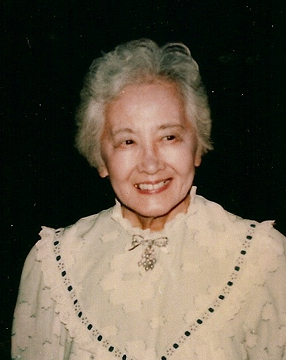
Katsuyo Lillian Takeshita
Camp Name:
Heart Mountain
Block Number:
12
Barracks Number:
10-D
Location during WWII, if not in a camp:
Washington, D.C.
Katsuyo Lillian
Takeshita
Katsuyo Lillian Takeshita was well named by her parents. “Katsuyo” means “to live victoriously, and overcome adversities with a winning spirit.” Despite the many hardships she faced early in life, she became an exceptionally beautiful, gracious, and accomplished person of distinction.
Katsuyo was born in San Francisco, California, on September 24, 1905. Her father, Hiroshi, was an educator and importer of Japanese art objects. Her mother, Chiyo, was a gifted artist. From infancy her life with beset by a series of devastating events—the San Francisco earthquake, her mother’s death when Katsuyo was 5 years old, and moving away from friends who helped care for her to the lonely towns of Wyoming where her father sought work. He tolerated no weeping or whimpering from his daughter, forcing her to bury any grief, and expected her to overcome adversity stoically. They finally settled in Salt Lake City, Utah where she attended grade school through the first few years of college. Before her father returned to Japan he arranged her marriage to Thomas K. Yamamoto, a chemistry graduate student who worked part time in his coffee shop. Thomas took the surname “Takeshita” to carry on her family name. Hiroshi also left them with many debts which the young couple were burdened to repay.
As Utah was suffering an economic slump, the Takeshitas and their baby daughter moved to Los Angeles, California for better opportunities. Beginning with a small dry cleaning business, they expanded until in 1937 they opened one of the first modern dry cleaning plants in Los Angeles. It met with much success until that fateful day when Pearl Harbor was bombed on December 7, 1941. As a result of E.O. 9066 and the ensuing evacuation, like all evacuees, they suffered tremendous financial/economic loss and worried about their future. With her husband and two daughters, the Takeshitas were sent to Heart Mountain, Wyoming.
After the initial shock of incarceration, they, like many internees, were determined not to be defeated by it. Katsuyo participated in many activities and taught English as a second language to Issei and Kibei. Through the Christian church she even met and befriended many of the women from the surrounding small towns of Cody and Powell. After one year in camp, she, her husband and youngest daughter left camp to relocate to Salt Lake City, Utah. From there Katsuyo and Thomas applied for Federal Government jobs as translators because of their bilingual skills. In 1944 this led to their being hired by the Federal Broadcasting Intelligence Service (FBIS) in Washington, D.C. They became part of a staff that translated into English intercepted communications from Japan for our Government. It opened a whole new world to them.
When World War II ended and the FBIS closed its offices, Katsuyo won a position at the Library of Congress in Special Cataloging translating and cataloging confiscated Japanese books and materials for the Library system. She also worked in the Library’s Orientalia Division. Katsuyo was employed at the Library of Congress for over 30 years, and retired in 1979 as Head of Asian Materials. She loved her work at this prestigious and stimulating institution. She loved living in Washington, D.C. and the opportunity to use her skills in a useful way. Katsuyo helped establish the JACL chapter in Washington, D.C., and she participated in church activities that created a friendship between its White and Japanese members.
Katsuyo retired and moved to Hawaii to reside with her daughter. There she was instrumental in helping to organize the Honolulu JACL chapter. Despite E.O. 9066 and ironically because of it, Katsuyo’s victorious spirit rose above defeat and won her a wonderful life while serving her country and community with honor and distinction